On the 22nd of April three of our Nursery orphans were translocated to Tsavo, this time to our Voi Relocation Unit, to embark on the next phase of their journey to becoming wild elephants once more
On the 22nd of April three of our Nursery orphans were translocated to Tsavo, this time to our Voi Relocation Unit, to embark on the next phase of their journey to becoming wild elephants once more. This is a journey that takes times, just as it does with ones own children, because at any age an elephant duplicates that of a human. Tundani, best friend Nelion and mischevious Lentili are still young, and very much milk and Keeper dependent, but they were ready for the stimulation of the older orphans, the ex orphans and their wild friends, and as the years past exposure to these older elephants helps teach them the important ways of the wild.
Today these three Nursery elephants were making their transition, and as is the form usually, we loaded them extremely early so that a good part of their journey to Voi, a distance of over 400km, could be during the cool of the morning. Without any resistance the three Nursery orphans were loaded into the custom built elephant moving truck. They remained with their Keepers who were making the journey with them, and had good stocks of both mixed milk and browse travelling with them in the back.
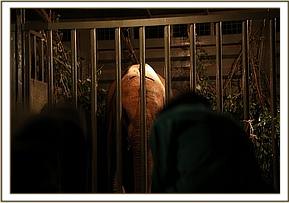
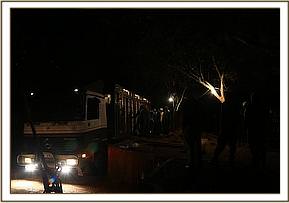
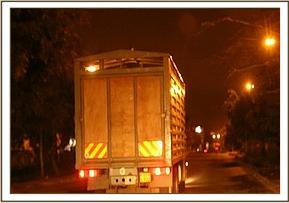
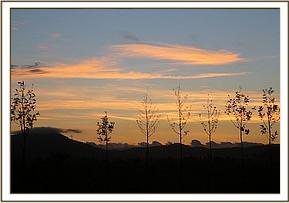
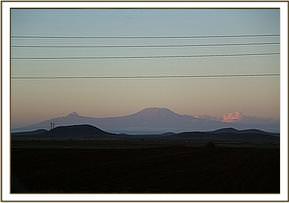
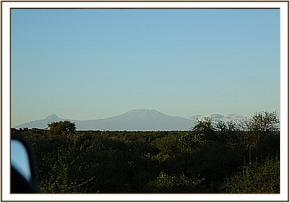

With a land rover following behind to provide an escort should anything untoward happen, the convoy rolled out of the DSWT HQ gates of Nairobi National Park at 3.30am. At that time in the morning there was hardly a car on the roads so they were out of the city in no time, and winding their way down to lower country along the Nairobi Mombasa main highway. As dawn a beautiful day was revealed with extraordinary clarity. Mount Kilimanjaro was out in full glory, as were the Chyulu Hills in the foreground.
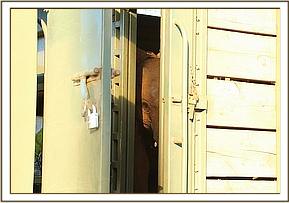
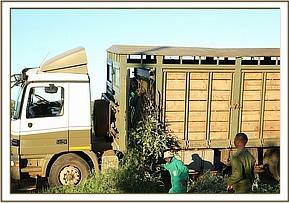

The convoy drove past the Kibwezi Forest entrance where just a few days earlier Ziwa and Balguda had been translocated. However this trio were destined for our Voi Rehabilitation Unit. The David Sheldrick Wildlife Trust has three relocation units within the Tsavo Conservation Area, with Voi being our original one and where our oldest ex orphans reside. Here we have enjoyed success over the years and have known great joy as many of our orphans have had wild born babies. This unit was born in the early 50’s when the very first elephant orphans Samson and Fatuma were raised by David Sheldrick, the founder warden of Tsavo National Park. Presently at Voi we have 24 orphans still dependent returning to their night stockades each evening.
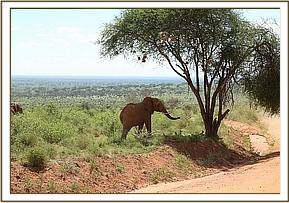
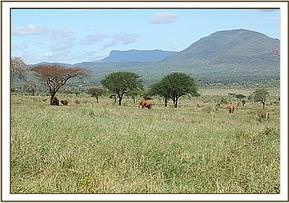
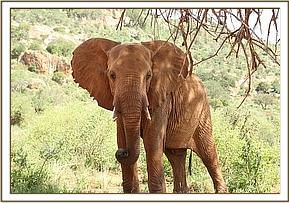


By 9.30 am the Nairobi convoy had reached Manyani gate of Tsavo East National Park and turned in to proceed the remaining distance on the dirt roads through the National Park, passing wild elephants on route.Storm clouds were building and it was clear that in the afternoon Voi was going to enjoy some rain. Our three travellers we still doing well, completely calm and resigned to their fate, totally trusting of their Keepers. As the procession made it’s way up the hill nearing the Voi Unit stockades Angela and Robert were remarking on just how smoothly this translocation had gone given the distance travelled.
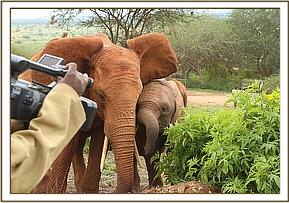
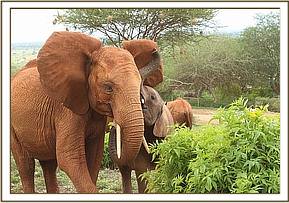
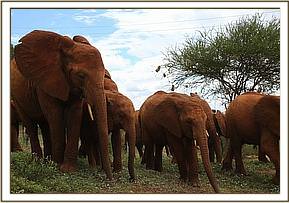
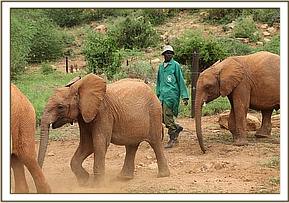
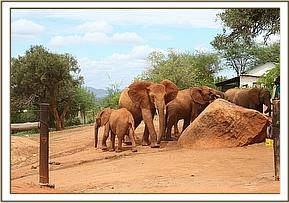

This as it turned out was premature as while James manoeuvred the truck to turn at the entrance so to reverse back putting the exit doors flush against the loading ramp, the front tyres became firmly stuck. Robert tried hard in the land rover to pull the truck out, but to no avail. The Trust tractor was called upon to attempt the same and still no luck. Not wanting to subject our orphans to any delays with the storm clouds brewing and the temperatures rising Angela suggested that the loading ramps be lowered so that the option was there for the orphans to climb out as best they could.
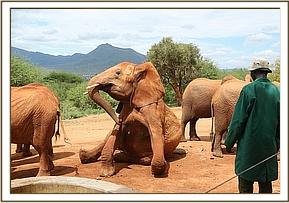
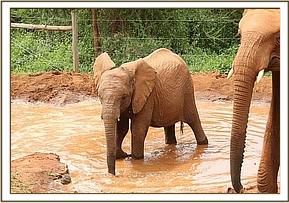
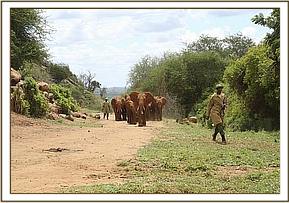
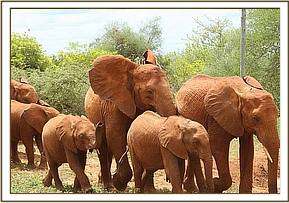
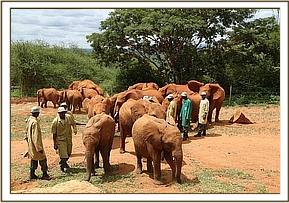

Remarkably the three new arrivals carefully clambered out of the truck despite the acute angle and were immediately enveloped by a sea of trunks of the older ex orphans, who by this stage had worked themselves into quite a frenzy of anticipation, sensing the presence of the new arrivals. Tundani was first out, and having cautiously manoeuvred himself down and the others then followed without a fuss. Their greetings was overwhelming as the Voi orphaned females were excited and eager to have some more babies to spoil.
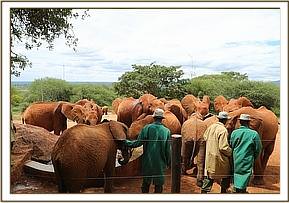
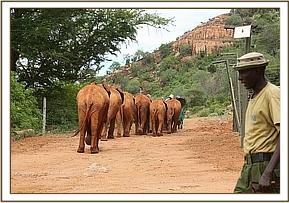
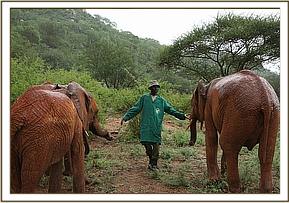
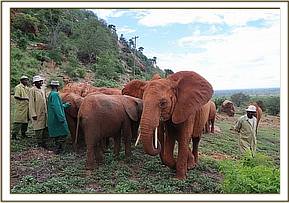

Wasessa could no contain herself, lying down, sitting up, spinning round and charging trumpeting, she just could not express her joy enough. Tundani was comfortable knowing that he was surrounded by two of his best friends from the Nursery, and his trusted Keepers, and took the attention in his stride, although alittle more clingy to their Keepers than usual, the three remained close as they were showered in more elephant attention than they had ever known.
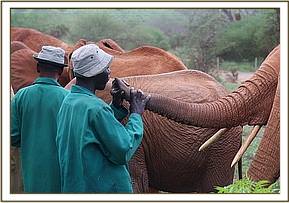
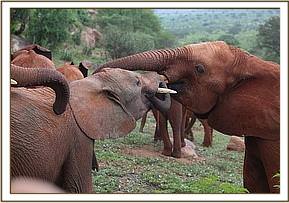
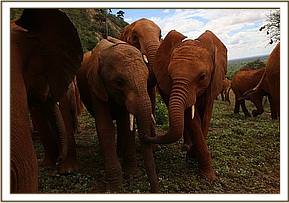
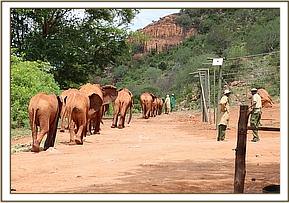
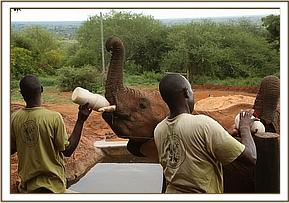

After a short while of meeting and greeting they were whisked away guided by their Keepers to have their fill of fresh water and then later taken to the mud wallow, but decided not to wallow at this time. The herd moved off with their Keepers further a field to browse on the slopes of Msinga Hill, with the new arrivals loving the fresh grass that was abundant thanks to the recent rains. Later that afternoon a storm blew through with gentle rain falling which cooled the new arrivals and made them all playful. That night things progressed well and it was clear that older ex orphans Lempaute and Sinya had singled the new arrivals out to be their own.
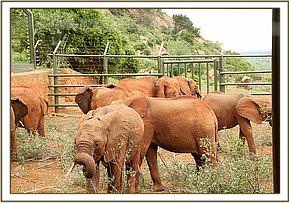
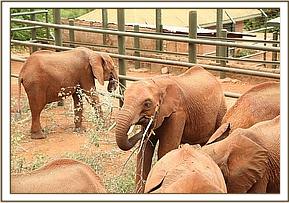
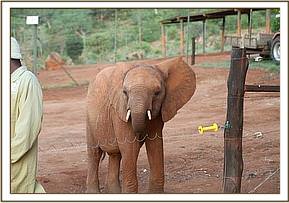
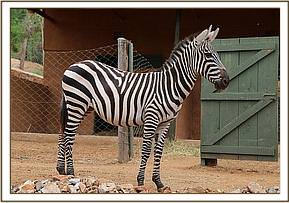

As the days have passed Tundani, Nelion and Lentili have settled in to their new surroundings and with each new day are growing in confidence. They have been privileged to meet ex orphans Emily and Edie’s herd with their two new tiny wild born babies Emma and Eden, and have been exposed already to wild elephants at the waterholes in the area. For Tundani, rescued on the 8th of April 2013, two years before from Tsavo, this is a return home, and for sure he remembers it. For Nelion rescued from the slopes of Mount Kenya in August of 2013, and little Lentili rescued from Laikipia, this is all very new for them, but comforted by each other, their beloved Keepers, and the guidance and influence of the older dependent orphans, they have settled in well. They will remain in our fold for at least another eight to ten years before being old enough and sufficiently confident to fly the nest, but their journey has begun.